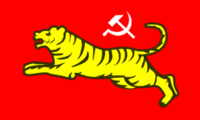All India Forward Bloc
Leveraging Netaji's sway over the populace, the organization had established its electoral footprint after Independence in states like Tamil Nadu, Andhra Pradesh, Kerala, and Assam, with West Bengal as its primary bastion.However, after eight decades, the party, now confined to select regions, lacks any Members of Parliament or Legislative Assembly representatives.Bose said that all who were joining, must never turn their back to the British and must fill the pledge form by cutting their finger and signing it with their blood.Other prominent members were Annapurniah from Andhra Pradesh, Senapati Bapat, Hari Vishnu Kamath from Bombay, Pasumpon U. Muthuramalingam Thevar from Tamil Nadu and Sheel Bhadra Yagee from Bihar.The conference passed a resolution titled 'All Power to the Indian People', urging militant action for struggle against British colonial rule.[11] Inside India, local activists of the Forward Bloc continued the anti-British activities without central co-ordination.For example, in Bihar members were involved in the Azad Dasta resistance groups, and distributed propaganda in support of Bose and Indian National Army.The conference declared the formation of the 'FB Workers Assembly', in practice the legal cover of the still illegal Forward Bloc.The Workers Assembly conference declared that the "Forward Bloc is a Socialist Party, accepting the theory of class struggle in its fullest implications and a programme of revolutionary mass action for the attainment of Socialism leading to a Classless Society.Singh and Yagee, without consulting the Central Committee nor the party membership, declared the unification of the Forward Bloc into the Congress.A by-election for the Aruppukottai Lok Sabha constituency seat vacated by U. Muthuramalingam Thevar's death was held in 1964, in which the Forward Bloc was defeated for the first time.Nayar and Thevar accused the Forward Bloc of having deviated from its socialist principles through its co-operation with the rightwing Swatantra Party.CPI(M) leader Hare Krishna Konar characterised the events as a degeneration of the agrarian struggles in rural West Bengal.This caused an abrupt break-up of the Swatantra-AIFB alliance in Tamil Nadu, as the Swatantra Party sought to align itself with the Congress(O).[29] On 20 February, just ahead of the 1971 general elections, the All India Forward Bloc chairman Hemantha Kumar Bose was murdered in Calcutta.[33][34][35] In Tamil Nadu, the party contested one seat, Ramanathapuram, with the support of its allies in the Progressive Front (most notably the Congress(R) and Dravida Munnetra Kazhagam).Meanwhile, the Forward Bloc played an important role in securing Mukkulathor votes for its Progressive Front allies.The party obtained some significant voting in constituencies like Cooch Behar (22.17%) and Birbhum (19.70%), but in general it was defeated by the CPI(M) candidates.[40] On 28 March 1972, the party was able to win a seat in the Tamil Nadu Legislative Council (the upper house of the state assembly) for the first time.R. Sakthi Mohan was elected with the votes of the AIFB, DMK, PSP, Muslim League and the Tamil Arasu Kazhagam.[30][41] In the 1972 state legislative assembly election, the Forward Bloc presented one candidate in Assam,[42] five in Bihar[43] and two in Madhya Pradesh.[45] In West Bengal, where fresh elections to the state assembly were again held in 1972, the Forward Bloc launched 18 candidates.[46] After having contested the 1972 elections on its own, the Forward Bloc decided to join a 'United Front' led by the communist parties in Tripura.[47] The front demanded clear-cut policies for procurement and distribution of food grains, stopping spiralling prices of essential commodities, a land reform legislation for delimitation of Tribal reserve areas and creation of employment opportunities for the unemployed.The front vowed to maintain equidistance towards the two major blocs in Bihari politics, the Rashtriya Janata Dal and the National Democratic Alliance, condemning them as 'casteist and communal'.The party decided to contest a large number of seats without joining either of the two major political blocs in Tamil Nadu.Bengali immigrants like Sailesh Sen, Gopi Ballav Saha, Dwijen Deu, Anil Dasgupta, Hiren Nandi and Sati Bhardwaz are the other active members of the party.In the 2005 election to the Haryana legislative assembly AIFB ran a single candidate, Mukhtiar Singh Kaushik in the Nilokheri constituency.

All India Forward Bloc (disambiguation)Marxist Forward BlocChairmanSubhas Chandra BoseIndian National CongressAshok NagarKarol BaghNew DelhiStudent wingYouth wingAll India Youth LeagueWomen's wingTrade Union Coordination CentreIdeologySocialismMarxismLeft-wing nationalismPolitical positionLeft-wingWest BengalI.N.D.I.A.All IndiaLeft FrontTripuraAIADMK-led AllianceTamil NaduKeralaWest Bengal Legislative AssemblyPolitics of IndiaPolitical partiesElectionsleft-wing nationalistpolitical partyfaction1951–19521957 Indian general electionSarat Chandra BoseChitta BasuAndhra PradeshHistoryOutlineFrench RevolutionRevolutions of 1848Socialist calculation debateSocialist economicsCalculation in kindCollective ownershipCooperativeCommon ownershipCritique of political economyEconomic democracyEconomic planningEqual opportunityFree associationFreed marketIndustrial democracyInput–output modelInternationalismLabour-time calculationLabour voucherMaterial balance planningProduction for useSharing economySpontaneismSocial dividendSocial ownershipSocialism in one countrySocialist mode of productionSoviet democracyStrike actionTo each according to his contributionVanguardismWorkers' self-managementWorkplace democracyCommunalismInclusive DemocracyProject CybersynSoviet-typeMarket socialismLange modelMutualismSocialist market economySocialist-oriented marketParticipatory economicsVariants21st-centuryAfricanAgrarianAnarchismAuthoritarianBlanquismBuddhistChineseChristianCommunismDemocraticDemocratic roadDigitalEthicalEcologicalEvolutionaryFeministFourierismFree-marketGandhianIslamicJewishLiberalLibertarianMarhaenismMarketMunicipalNationalistNkrumaismOwenismPopularReformismReligiousRevolutionaryRicardianScientificSocial democracySyndicalismThird WorldUtopianYellow